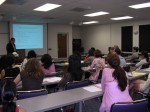Past Events

- This event has passed.
Being Multiracial in America: Evidence from the 2000 Census and the 2004 American Community Survey
May 25, 2006
 Matthew Snipp, Ph.D.
Matthew Snipp, Ph.D.
Professor of Sociology
Stanford University
PROGRAM
3:40-3:55 pm Sign-in for CE credit (1 hour)
4:00-5:00 pm Lecture
5:00-6:00 pm Reception in Franz Hall Rm 3423
LEARNING OBJECTIVES
Goals/Desired Outcomes:
Much has been made about the introduction of the new race question in the federal statistical system that allowed individuals to choose more than one race. The goal of this talk is to examine some of this data and review the implications for understanding the racial composition of America. Three particularly important issues concern: 1) the growth trajectory of this population; 2) the socioeconomic heterogeneity that exists within subgroups of the multiracial populations; and 3) the significance of this population as it affects denominational estimates of rates in health statistics and other related data. Implications for American Indian/ Alaska Native populations will be discussed.
Objectives – By the end of this talk, participants will be able to:
1. Gain an understanding of Census data on the racial composition of America and implications of recent Census data for the understanding of racial and ethnic identity issues and self-reporting behaviors.
2. Learn about the significance of the multiracial population as it affects health and mental health statistics and other related data.
3. Understand implications for the measurement of American Indian/Alaska Native populations� health and mental health statistics.
ABOUT DR. MATTHEW SNIPP
Is Professor of Sociology at Stanford University. Dr. Snipp is currently working with Current Population Survey and other Census data that were especially collected using several different variations of a question designed to elicit information about racial identification. He is particularly interested in how factors such as residence, education, and family composition are related to racial identification and especially to questions about multiracial backgrounds, and how this might change under different scenarios of immigration and intermarriage rates.
ABOUT UCLA CRETSCMHD
A diverse group of faculty, health professionals, community-based agencies, and minority media have joined together though CRETSCMHD to effectively reduce or eliminate disparities in health among racial and ethnic minorities. As part of the Center’s mission CRETSCMHD will be offering a series of educational lecture for UCLA faculty, local health care providers and organizations focused on service delivering and health planning. these sessions focus on the elimination of health disparities in the areas of cancer, diabetes, and coronary heart disease.
Center Director:
Vickie M. Mays, Ph.D., MSPH, Professor, UCLA Department of Psychology & Department of Health Services, School of Public Health
ABOUT THE UCLA AMERICAN INDIAN STUDIES CENTER (AISC)
The core goals and objectives of the UCLA American Indian Studies Center AISC are to facilitate research and research collaborations; disseminate research results through research conferences, meetings and other activities; strengthen graduate and undergraduate education by providing students enrolled in the American Indian Studies program with training opportunities and access to facilities; to seek extramural research funds; and carry out university and public service programs related to the Center’s research expertise.
ABOUT THE CENTER FOR AMERICAN INDIAN RESEARCH AND EDUCATION (CAIRE)
The mission of the Center for American Indian Research and Education (CAIRE) is to improve the health and well-being of American Indians and Alaska Natives. Faculty associated with CAIRE mentor American Indian students at the University in all areas of research and identify and supervise student projects that take place on reservations. CAIRE faculty and staff conduct research in areas of cancer prevention, screening, and behavior change; tobacco control; diabetes prevention and intervention and wellness education.
ABOUT THE UCLA SCHOOL OF LAW NATIVE NATIONS LAW AND POLICY CENTER
The mission of the UCLA Native Nations Law and Policy Center is to support Native Nations nationally in enhancing their governmental institutes and laws, to strengthen cultural resource protections, and to address critical public policy issues by bringing together the University’s academic resources and the knowledge and experience of tribal leaders and knowledge-holders.
ABOUT THE UCLA SCHOOL OF LAW TRIBAL LEARNING COMMUNITY AND EDUCATIONAL EXCHANGE (TLCEE)
The UCLA School of Law Tribal Learning Community and Educational Exchange’s (TLCEE) primary objective is to develop and deliver relevant curricula in collaboration with Native community members and traditional knowledge bearers, focusing on the enhancement of Native governance and cultural resource protection. In addition, TLCEE encourages Native youth and Tribal professionals to enroll in college level course and works to serve as a base for Native community members attending UCLA.
LOCATION & PARKING
Stop at any of the UCLA parking kiosks to purchase a parking permit for structure #2. Attendants will be on duty to collect $8 and direct you to structure #2.
ABOUT THE LECTURE
This lecture is presented by the Semel Institute at UCLA, a CMA-accredited provider, in association with the UCLA Center for Research, Education, Training, and Strategic Communication on Minority Health Disparities (CRETSCMHD), the UCLA American Indian Studies Center (AISC), the Center for American Indian Research and Education (CAIRE), the UCLA School of Law Native Nations Law and Policy Center and the UCLA School of Law Tribal Learning Community and Educational Exchange (TLCEE).







